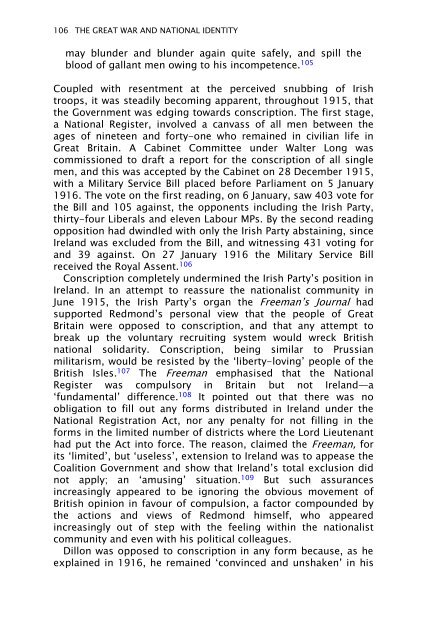Dividing Ireland: World War I and Partition
Dividing Ireland: World War I and Partition
Dividing Ireland: World War I and Partition
Create successful ePaper yourself
Turn your PDF publications into a flip-book with our unique Google optimized e-Paper software.
106 THE GREAT WAR AND NATIONAL IDENTITY<br />
may blunder <strong>and</strong> blunder again quite safely, <strong>and</strong> spill the<br />
blood of gallant men owing to his incompetence. 105<br />
Coupled with resentment at the perceived snubbing of Irish<br />
troops, it was steadily becoming apparent, throughout 1915, that<br />
the Government was edging towards conscription. The first stage,<br />
a National Register, involved a canvass of all men between the<br />
ages of nineteen <strong>and</strong> forty-one who remained in civilian life in<br />
Great Britain. A Cabinet Committee under Walter Long was<br />
commissioned to draft a report for the conscription of all single<br />
men, <strong>and</strong> this was accepted by the Cabinet on 28 December 1915,<br />
with a Military Service Bill placed before Parliament on 5 January<br />
1916. The vote on the first reading, on 6 January, saw 403 vote for<br />
the Bill <strong>and</strong> 105 against, the opponents including the Irish Party,<br />
thirty-four Liberals <strong>and</strong> eleven Labour MPs. By the second reading<br />
opposition had dwindled with only the Irish Party abstaining, since<br />
<strong>Irel<strong>and</strong></strong> was excluded from the Bill, <strong>and</strong> witnessing 431 voting for<br />
<strong>and</strong> 39 against. On 27 January 1916 the Military Service Bill<br />
received the Royal Assent. 106<br />
Conscription completely undermined the Irish Party’s position in<br />
<strong>Irel<strong>and</strong></strong>. In an attempt to reassure the nationalist community in<br />
June 1915, the Irish Party’s organ the Freeman’s Journal had<br />
supported Redmond’s personal view that the people of Great<br />
Britain were opposed to conscription, <strong>and</strong> that any attempt to<br />
break up the voluntary recruiting system would wreck British<br />
national solidarity. Conscription, being similar to Prussian<br />
militarism, would be resisted by the ‘liberty-loving’ people of the<br />
British Isles. 107 The Freeman emphasised that the National<br />
Register was compulsory in Britain but not <strong>Irel<strong>and</strong></strong>—a<br />
‘fundamental’ difference. 108 It pointed out that there was no<br />
obligation to fill out any forms distributed in <strong>Irel<strong>and</strong></strong> under the<br />
National Registration Act, nor any penalty for not filling in the<br />
forms in the limited number of districts where the Lord Lieutenant<br />
had put the Act into force. The reason, claimed the Freeman, for<br />
its ‘limited’, but ‘useless’, extension to <strong>Irel<strong>and</strong></strong> was to appease the<br />
Coalition Government <strong>and</strong> show that <strong>Irel<strong>and</strong></strong>’s total exclusion did<br />
not apply; an ‘amusing’ situation. 109 But such assurances<br />
increasingly appeared to be ignoring the obvious movement of<br />
British opinion in favour of compulsion, a factor compounded by<br />
the actions <strong>and</strong> views of Redmond himself, who appeared<br />
increasingly out of step with the feeling within the nationalist<br />
community <strong>and</strong> even with his political colleagues.<br />
Dillon was opposed to conscription in any form because, as he<br />
explained in 1916, he remained ‘convinced <strong>and</strong> unshaken’ in his








